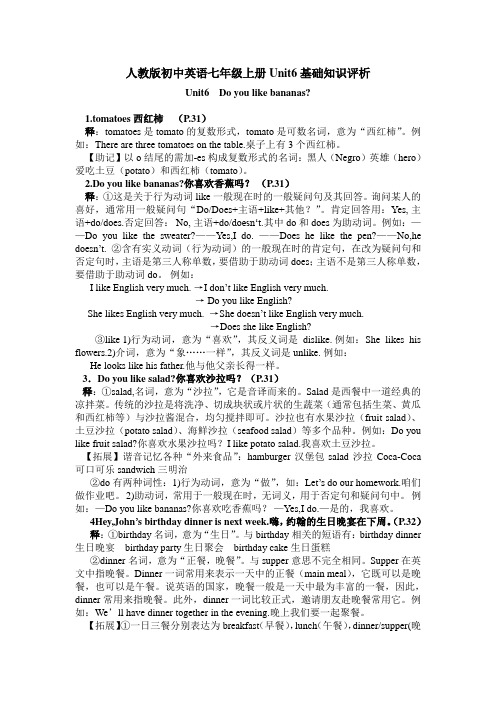2018_2019学年七年级英语上册Unit6Let’sGo单元整体分析、话题相关链接(新版)冀教版
- 格式:doc
- 大小:117.00 KB
- 文档页数:1

人教新版英语七年级上册Unit6讲义单元概述本单元主要介绍了关于旅行和交通工具的词汇和句型。
通过研究本单元内容,学生将能够掌握一些基本的旅行用语,了解不同的交通工具及其用途。
单元目标1. 掌握关于旅行和交通工具的常用词汇,如car, train, bus, bike 等;2. 研究描述交通工具的句型,如"What's this?"和"It's a bike."等;3. 学会询问和回答关于旅行的问题,如"How do you go to school?"和"I go to school by bus."等。
词汇研究本单元涉及的主要词汇有:1. car - 汽车2. train - 火车3. bus - 公交车4. bike - 自行车5. plane - 飞机6. subway - 地铁7. ship - 船8. walk - 步行句型研究本单元涉及的常用句型有:1. What's this? - 这是什么?2. It's a car. - 这是一辆汽车。
3. How do you go to school? - 你怎么去学校?4. I go to school by bus. - 我坐公交车去学校。
练与巩固- 完成课本上的课后练题,巩固对词汇和句型的理解和运用;- 利用课本对话和句型,进行实际对话练,提高口语表达能力;- 设计一份关于交通工具的问卷调查,帮助学生加深对交通工具的了解。
以上为《人教新版英语七年级上册Unit6讲义》的简要内容介绍,希望对您有所帮助。




人教版初中英语七年级上册Unit6基础知识评析Unit6 Do you like bananas?1.tomatoes西红柿(P.31)释:tomatoes是tomato的复数形式,tomato是可数名词,意为“西红柿”。
例如:There are three tomatoes on the table.桌子上有3个西红柿。
【助记】以o结尾的需加-es构成复数形式的名词:黑人(Negro)英雄(hero)爱吃土豆(potato)和西红柿(tomato)。
2.Do you like bananas?你喜欢香蕉吗?(P.31)释:①这是关于行为动词like一般现在时的一般疑问句及其回答。
询问某人的喜好,通常用一般疑问句“Do/Does+主语+like+其他?”。
肯定回答用:Yes, 主语+do/does.否定回答: No, 主语+do/doesn‘t.其中do和does为助动词。
例如:——Do you like the sweater?——Yes,I do. ——Does he like the pen?——No,he doesn’t. ②含有实义动词(行为动词)的一般现在时的肯定句,在改为疑问句和否定句时,主语是第三人称单数,要借助于助动词does;主语不是第三人称单数,要借助于助动词do。
例如:I like English very much. →I don’t like English very much.→ Do you like English?She likes English very much. →She doesn’t like English very much.→Does she like English?③like 1)行为动词,意为“喜欢”,其反义词是dislike. 例如:She likes his flowers.2)介词,意为“象……一样”,其反义词是unlike. 例如:He looks like his father.他与他父亲长得一样。

2018-2019学年七年级英语上册Unit6Let’sGo 单元整体分析、话题相关链接(新版)冀教版1 / 1宝宝宝宝嘻嘻嘻 Unit 6 Let's Go!名 词 ( n .) : lady, traffic, luck, noise, lion, forest, course, countryside,museum, hall,war, history,area,gift,movie,theatre, price, hero, airport, hotel动词 ( v .) : ride, follow, count, miss, feed, pick, learn, save 数词 ( .) : forty, fifty, sixty, seventy, eighty, ninety, hundred单词卡片num形容词 ( adj .) : fresh, lonely, friendly, famous, boring 副词 ( adv .) : off兼类词: straight ( adv . & adj .),dream ( v . & n . ), magic ( adj . & n .),fight (v . & n . )教课目的get off, get lost, on the way to, look for, next to, go to the zoo,短语概括make noises, of course, on the farm, by bike, find out (A) 问路和指路的句型: 1.How can we get there ?2.Go down this street. Turn left at the traffic lights.(B) 购物的句型:句型荟萃?1.May/Can I help you2.What can I do for you ?3.I will take it.1. 简单的问路与指路的方法。
七年级英语U6知识点归纳总结Unit 6 - Knowledge Points Summary for 7th Grade EnglishIn this article, we will summarize and consolidate the key knowledge points covered in Unit 6 of the 7th-grade English curriculum. By providing a clear and concise overview of the topics, we aim to help students better understand and revise the material. Let's delve into the main concepts and skills taught in this unit.1. Verb Forms and UsageOne crucial aspect of Unit 6 focuses on enhancing students' understanding of verb forms and their usage in English. This includes learning about regular and irregular verbs, as well as the different tenses such as simple present, simple past, and simple future. Furthermore, students are introduced to the concept of verb agreement and the proper use of auxiliary verbs in forming interrogative and negative sentences.2. Expressing Likes and DislikesAnother important area covered in Unit 6 involves expressing preferences and opinions. Students learn how to use the phrases "like," "love," "hate," "enjoy," and "prefer" to express personal likes and dislikes. Through various exercises and examples, they develop an understanding of using these expressions effectively in conversation and written communication.3. Giving AdviceUnit 6 also equips students with the skills necessary to give advice using appropriate language and structures. They learn how to construct sentences using "should" and "shouldn't" to provide suggestions and recommendations. Additionally, students acquire knowledge of modal verbs such as "could" and "might" to express possibility and uncertainty when offering advice.4. Future Plans and IntentionsUnit 6 covers vocabulary and expressions related to discussing future plans and intentions. Students learn to use phrases like "going to" and "want to" to express planned actions and aspirations. They also practice using time expressions and adverbs to indicate when these future events will take place.5. Asking for and Giving DirectionsIn this unit, students develop their ability to ask for and provide directions in English. They learn key vocabulary related to locations and directions, such as "turn left," "go straight," "intersection," and "opposite." Utilizing this vocabulary, students engage in role-plays and dialogues to enhance their communication skills and ensure they can navigate and assist others in unfamiliar places.6. Writing EmailsFinally, Unit 6 introduces students to the basics of writing formal emails. They learn the appropriate structure and language to use when composing emails for various purposes, such as making inquiries, seeking advice, or expressing opinions. Additionally, students become familiar with email etiquette, including the use of formal greetings and closing remarks.Overall, Unit 6 of the 7th-grade English curriculum provides students with a comprehensive range of language skills and knowledge. By mastering verb forms and usage, expressing likes and dislikes, giving advice, discussing future plans, asking for and giving directions, and writing emails, students are equipped with fundamental tools to improve their English proficiency. It is essential for students to regularly review and practice these key knowledge points to ensure continued progress in their language learning journey.In conclusion, this summary has outlined the main knowledge points covered in Unit 6 of the 7th-grade English curriculum. The comprehensive understanding of these topics will undoubtedly contribute to students' overall language proficiency and enable them to communicate effectively in English.。
人教版七年级英语上册Unit 6 Do you like bananas?1. like 喜欢1)like sb. / sth.喜欢某人/某物2) like to do sth.喜欢/想要做某事(表一次性或特指的某一具体的动作)3) like doing sth喜欢做某事(表习惯性的动作或爱好)①我喜欢每天打篮球。
I like playing basketball every day.②今天很冷,我喜欢呆在家里。
Today is cold, I like to stay at home.2. 名词的分类1)名词分为“专有名词”和“普通名词”两大类。
专有名词是个别的人、事物、地点等专有的名称,如:Gina, China。
专有名词的第一个字母要大写。
2)普通名词又可分为下面四类:①个体名词:表示某类人或东西中的个体。
如pen, student, apple。
②集体名词:表示若干个体组成的集合体。
如family, class。
③物质名词:表示无法分为个体的物质。
如water, broccoli等。
④抽象名词:表示动作、状态、品质、情感等。
如work, happiness等。
个体名词和集体名词都是可数名词,物质名词和抽象名词都是不可数名词。
3)有些名词既可作可数名词又可作不可数名词,但意义不同,要注意区分。
①glass C. 杯子U 玻璃orange C 橘子U. 橘汁②还有表示动物类的名词,表示动物时是可数名词,作为菜肴时是不可数名词。
chicken C 小鸡U 鸡肉fish C.鱼U. 鱼肉③salad, ice cream, food, fruit 作总称讲是不可数名词,作种类讲是可数名词She likes hamburgers, salad and apples.a salad of tomato3. good / well1) good adj “好的”,常用来修饰名词。
a good student一位好学生That sounds good.(表语)2)well ①adj “好的”,“健康的”(指身体好)He doesn’t feel well.他感觉不舒服。
309教育网
309教育资源库 Unit 6
Let's Go!
问路(Asking the way):问路是到达目的地最省事、最有效的办法。
在英美国家,人们对于外国人问路通常会热心回答。
但在问话时,他们不喜欢你一口气很流利地背出许多问话,也不喜欢在别人思考你的问题时你一直追问,更不喜欢陌生人离他们太近,这样会使他们觉得很不自在,甚至觉得是一种威胁,因为西方人的空间意识很强。
购物(Shopping):英美人把周末当作上街购物日,他们喜欢在这时开着自己的车,上街购足一周所需要的日用品和食品。
星期日他们则喜欢在家料理家务,或外出郊游、访友。